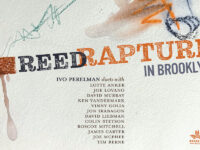by S. Victor Aaron
At the base level, music’s purpose is to entertain. Some musicians go beyond mere entertainment and use their music to promote a point of view, provoke thought and kindle certain kinds of emotions. Hand in hand with those higher goals are the use of music as a vehicle to educate listeners.
On The Angola Project, jazz saxophonist/composer Howard Riley seeks to educate listeners, both about a piece of African-American history and the music that was formed by it. The subject matter here, prison spirituals of the Angola State Penitentiary of Louisiana, is obscure. But at the same time, it offers a glimpse of the more basic forms of music that later evolved into folks, blues, jazz, gospel…even New Orleans-style blues.
The Oakland, Calif.-born twentysomething Wiley wasn’t inclined at first to go back and delve into the spirituals of prisoners from fifty years ago half a continent away. But after some persistence by a enthnomusicologist friend, he found that much of the music resonated with him. This eventually led to his visit of the prison a couple of years ago and the soaking in of recordings from the fifties by famous folk music archivist Alan Lomax, as well as Harry Oster. By that time, Wiley had decided it was time to put together an album inspired by these prison spirituals, the result of which came to fruition earlier this year with the release of The Angola Project.
If you look up Howard Wiley in the AllMusic website, you’ll see him listed under the “soundtrack” genre. That’s an inaccurate characterization of him since as far as I can tell, he hadn’t done movie soundtrack records. But it’s not that far off, either, as Wiley’s music here does play like a soundtrack to an old, often downbeat black and white movie, with some new, unconventional twists thrown in. And that’s probably just the imagery he wants the music to conjure up.
Many of the songs presents here were either drawn directly from the traditional spirituals from Lomax’s recordings or Oster’s Angola Prison Spirituals (1960), or inspired by them. Both “Rise And Fly” and “Twelve Gates To The City” are old spirituals that particularly struck Wiley as “some of the most powerful and original music I’ve ever heard.”
The dramatic call and response of the various soloist to the band at large in “Rise And Fly” sounds oddly similar to the Cream’s “White Room” and also suggests the influence that the earlier forms of African-American music had on such progressive jazz pioneers like Charles Mingus and John Coltrane.
“Twelve Gates To The City,” on the other hand, is given a more uptempo, straight-jazz treatment by Wiley, with the front-line horns of Wiley Geechi Taylor (trumpet) and Danny Armstrong (trombone) replacing the a capella vocals of the customary arrangement. The result is a song that possesses the inspiration of gospel and the spunk of Dixieland jazz.
Even more forceful is the shouting of the horns in Wiley’s own “Rosie,” which approximates the field hollers of the inmates working on prison farms. The addition of cello and violins provide a more somber shading, and a vocal scat gives it a stronger jazz element.
The small string sections are used more extensively on the downcast numbers like “Angola” (where Wiley is joined on tenor by avant garde legend David Murray, who contributes an impassioned wailer of a solo), “The Conversation” and “Trouble Of The World.” These selections, as well as “Amazing Grace” and “No More My Lawd” also feature female vocals sung opera-style, which feels out of place on this set of recordings; it’s rooted in neither jazz nor prison spirituals. My guess is that Wiley sought to add a more despondent mood appropriate to the subject matter.
Also out of place (but welcome, nonetheless) is a fairly straightforward rendition of Ornette Coleman’s “Peace,” who Riley dedicated to his recently deceased uncle.
The album ends on a merry note; “Second Line” is just a traditional New Orleans Mardi Gras blues number, but played with an contagious exhuberence by Wiley and his cohorts. It represents the Crecent City destination where Angola inmates up the road dreamed about being.
The Angola Project isn’t the first time the infamous state prison has provided impetus for music on the outside; the bluesman Robert Pete Williams drew heavily from his time there after he got out and started performing. Aaron Neville’s “Angola Bound” from Warm Your Heart was clearly drawn from these spirituals. But it took a talented young man with no prior connection with Angola to transform the music into something new without ever losing the connection with the songs as they were sung with inspiration many decades ago by people who had little to be inspired about.
- Christian Marien Quartett – ‘How Long Is Now’ (2024) - April 18, 2024
- Dave Douglas, feat. James Brandon Lewis – ‘Gifts’ (2024) - April 11, 2024
- Thollem – ‘Worlds In A Life, Two’ (2024) - April 8, 2024




